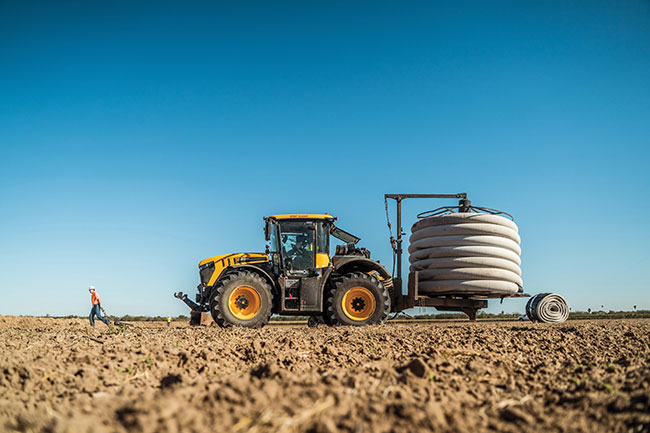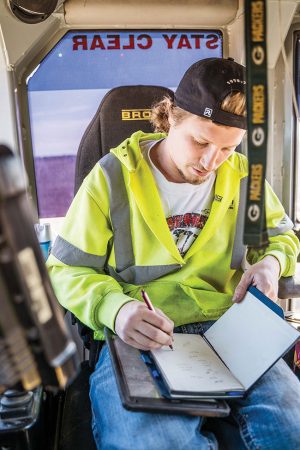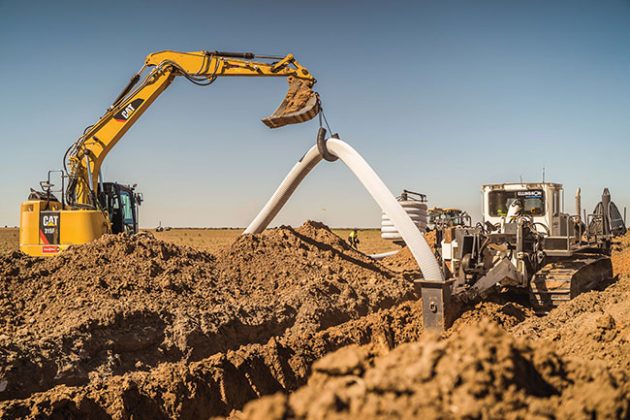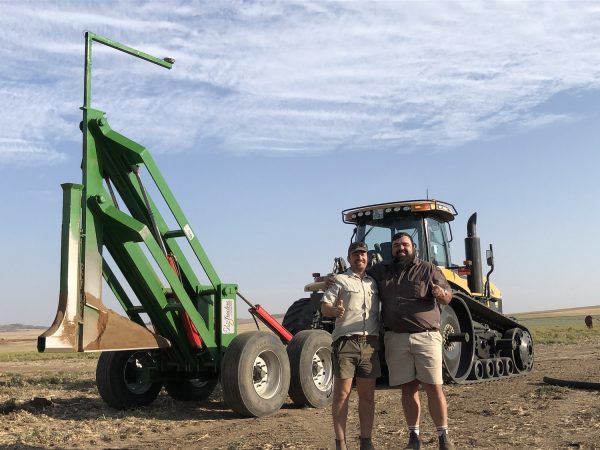
Features
Contractor at Work
COVID-19 and drainage
How is the pandemic impacting contractors?
May 5, 2020 By Tom Walker
 Depending on the location, there are variations between regional government guidelines for sheltering in place and the closing of non-essential businesses and this can dictate what work is being allowed. Photo courtesy of Ellingson Companies.
Depending on the location, there are variations between regional government guidelines for sheltering in place and the closing of non-essential businesses and this can dictate what work is being allowed. Photo courtesy of Ellingson Companies. How is COVID-19 affecting your business? That is a question Drainage Contractor magazine asked a number of businesses across the industry as the novel coronavirus went from being a far-off concern to front-page news.
The impacts of the global pandemic vary around the world, but certain terms such as “social distancing” are found far and wide. Generally, throughout North America, work is continuing. It is not strictly “business as usual,” but projects are being completed.
Depending on the location, there are variations between regional government guidelines for sheltering in place and the closing of non-essential businesses and this can dictate what work is being allowed. “Michigan has halted all residential and non-essential commercial construction,” explains Bob Clark II, president of Clark Farm Drainage, in Indiana. “But in Indiana and Ohio we haven’t seen that issue yet.” New York, Pennsylvania and Washington states have also limited non-essential construction, but that can mean different things for different states.
Agriculture is considered an essential service and is exempt from restrictions, so projects in agriculture are continuing. “We have to set up the fields so farmers can plant,” says Keith Jaques, owner of Jaques Farm Drainage in Ontario. Clark agrees. “Guys are going to want to start planting in a couple of weeks,” Clark adds. “It’s way too muddy right now but we have to get projects done so we are working away.”
At present, the slowing economy has not had a significant effect on projects. “I’ve got dairy farmers who are being told to dump milk,” says Mike Neeb of Roth Drainage in Ontario. In Canada, milk production is subject to supply management and amounts are controlled to ensure a good return. The, hopefully short-term, dumping of milk is a result of many factors, including transportation and storage logistics, and reduced demand. “So they are humming and hawing, and they might not do the project until the fall.”
“So [some farmers] are humming and hawing, and they might not do the project until the fall.”
Clark says farmers in Indiana have been affected by poor commodity prices recently. “But I haven’t had anybody call me and cancel a project because corn fell 40 or 60 cents,” he says.
Government funded jobs are a wild card at the moment, contractors say, and it will depend on budget adjustments coming out of the COVID-19 situation.
There is an impact on developing new contracts. “It is hard to look at a drain tile map from six feet away,” quips Matt Dull, vice president of sales and marketing for Ellingson companies in Minnesota. “And we can’t go a sit at a grower’s kitchen table to have a conversation about their field.”
It is a good thing that technology has advanced the way it has, Dull says, and job details can be sent by electronic means. But it is hard to develop new business relationships over the phone. “Having a remote conversation is a lot easier to do with an established customer,” Dull says.
But it is hard to develop new business relationships over the phone. “Having a remote conversation is a lot easier to do with an established customer,” Dull says.

Workers travel in individual vehicles to the job site, machines are being sanitized after use, and operators do not switch machines as a COVID-19 protocol. Photo courtesy of Ellingson Companies.
First and foremost, COVID-19 has brought a focus to worker and customer safety, but companies report that it has not been especially onerous. Ellingson benefits from working in a number of industries, including electrical and oil and gas. “Working in those industries requires us to have a higher standard of safety than we might need in say agriculture,” Dull says. “But we carry out those requirements company wide.”
Others have stocked up on cleaning and sanitation supplies and developed a COVID-19 protocol. Workers travel in individual vehicles to the job site, machines are being sanitized after use, operators do not switch machines, and lunch breaks are staggered, or taken alone. Maintenance shops are practicing distancing, and no one shares tools. Offices are closed and managed remotely from home and if you are sick, you stay home. It’s not hard to practice social distancing in the field, contractors agree.
It’s not hard to practice social distancing in the field, contractors agree.
It is not that much of a burden, Dull explains. “We have put in COVID-19 safety precautions and as long as we are following those along with all other safety items we are getting work done,” he says. “Morning meetings have even more of an emphasis on risks at the job site.”

Agriculture is considered an essential service and is exempt from restrictions, so many drainage projects in agriculture are continuing as normal. Photo courtesy of Ellingson Companies.
“It takes time to do this stuff and we are not going to be as productive,” Neeb adds. “Sure, driving your own truck is an added expense, but if it can get us to work we will do it.”
The supply chain of an essential service is also essential, and generally contractors are not having issues with materials. “I have talked to tile manufacturers and because they are supplying agriculture they are allowed to keep working,” Jaques says. “A lot of companies already have tile produced. So far we haven’t seen any delays.”
“A lot of companies already have tile produced. So far we haven’t seen any delays.”
But sick workers can slow down suppliers. “If you have a cough you have to stay home,” Clark says. “I’m having problems getting supplies to a job site because they are short a couple of drivers.”
Roth Drainage says the pandemic has led them to have more of a focus on cleaning. “We weren’t real careful with that in the past,” Neeb admits. “Now after a person is finished with a machine we disinfect it.”
Dull with Ellingson in Minnesota adds to that, “Always make sure – and I am assuming every other contractor does this – that you understand the potential hazards and take care of your customers and take care of your team and you will be good.”
In Ontario, the fact that he and his company are still going strong was not lost on Keith Jaques. “We are still working but a lot of people are not, and you see people hoarding and running the supermarkets empty,” he says. “We knew there would be more people going to the food bank so as a gesture we made a donation to the food bank here.” Jaques has taken that farther and has issued a challenge to other contractors through the “Farm Drainage and Conservation” Facebook page. “Ken Watkins from Watkins Drainage matched that $500 to his local Salvation Army,” Jaques says.
“We see doom and gloom,” Dull says. “But it is nice to know that so many aspects of our world are operating just fine.”
Drainage and COVID-19 in South Africa

Johnnie van der Walt and his partner Chris Green (right) run Precision Drainage in South Africa. Photo courtesy of Johnnie van der Walt.
South Africa declared a National State of Disaster and issued a nation-wide lockdown order enforced by the police and army for 21 days until April 16. The lockdown restricted the population to their homes except for food, medicine and medical care, and collecting welfare grants. Essential service workers remain on the job. As of April 16, the country had 3,953 confirmed cases of COVID-19, and at the time of publishing, President Cyril Ramaphosa announced the country will start to gradually ease the lockdown starting May 1.
Johnnie van der Walt and his partner Chris Green run Precision Drainage in South Africa as a diversified business including some direct agriculture in hay making and land prep. “We are a registered essential service in agriculture, so we are allowed to travel and continue those operations,” Johnnie says. But the drainage side of the business has halted.
“The lockdown has unfortunately forced the pipe manufacturing factory to close, so we cannot get our pipe at all,” Johnnie explains.
“The lockdown has unfortunately forced the pipe manufacturing factory to close, so we cannot get our pipe at all,” Johnnie explains. “We also cannot get permits from the law enforcement for ‘abnormal transportation’ so our drainage projects are currently stalled until after the lockdown,” he says. Johnnie says that this points out a weakness they have always known in their business. “We do not manufacture our own pipe, so we have zero control over our biggest input which is a risk,” he says. “We would like to start our own pipe production factory, but currently the costs are too high.” There is lots of potential work for agriculture drainage in South Africa, Johnnie says. “We have high incidence of salinity and sodicity in irrigated soils so drainage forms part of the mitigation against this,” he notes. “But there is no government support for commercial farmers and they must pay for improvements out of their own cash flow.”
“We run a lean business model with just six other employees,” Johnnie says. “The South African economy is not strong and we have issues with crime, corruption, and racism, but this is an abnormal situation and we are flying by the seat of our pants.”
His advice? “Keep going, keep positive and this too shall pass.”
Print this page